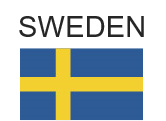This table here below aims at providing an overview of all the initiatives, such as the political communications, guidelines, and legislation, related to interoperability that have been put in place in Sweden.

National Interoperability Framework
The National Interoperability Framework (NIF) is a set of standards, policies, and guidelines that ensure that information and communication technology (ICT) systems can communicate and share data seamlessly. It promotes the development of interoperable systems that facilitate data exchange and collaboration between different organizations and levels of government. The NIF provides a common language and a framework for ensuring that ICT solutions are compatible, secure, and reliable, which enhances the efficiency of public services and improves citizen outcomes.
|
Swedish framework for digital collaboration (Svenskt ramverk för digital samverkan) Year: 2019 |
The Swedish framework for digital collaboration (i.e. the Swedish version of the EIF) will support all public and publicly funded organisations to navigate in the same direction and thereby exchange information effectively. |
Good Practices
This section provides examples at the national level in line with a selection of different thematic areas of the European Interoperability Framework (EIF). Further initiatives and good practices are available in the country’s Digital Public Administration Factsheet.
In Sweden, any software that is developed or acquired for the authority's activities will primarily be published as open source. This has been noticed by other authorities and has had impact for example on verksamt.se, the portal for starting, running and developing a business in the country. One example of an open source solution is the Network Open Source And Data (NOSAD), whose goal is to maintain a practical focus and help and inspire public sector authorities in taking the next step to increase the availability and use of open data. NOSAD is a cooperation between some public agencies, including the Swedish Public Employment Service, the DIGG, the Swedish Association of Local Authorities and Regions, and the Swedish Internet Foundation, as well as private actors.
The Data Protection Act complements and specifies the provisions set out in Regulation (EU) 2016/679 (General Data Protection Regulation). Several frameworks (law and ordinance) have also been put in place in Sweden for the processing of personal data for specific public authorities, as well as for the processing of personal data by competent authorities for the purposes of the prevention, investigation, detection or prosecution of criminal offences or the execution of criminal penalties (e.g., Brottsdatalagen law).
Several interoperability communities can be found in Sweden. These are centered on developing public sector value-chains and life events. Some of them tackle eSam (collaboration programme), digital-first projects, environmental data, and cross-sector information exchange government assignments. In the health sector, the Swedish eHealth Agency has government assignments focusing on interoperability.

